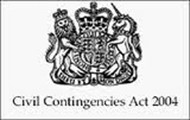2. Civil Contingencies Act 2004

Potentially the most important piece of legislation for working in disasters is the Civil Contingencies Act 2004, which was introduced in the UK following the Foot and Mouth outbreak in 2001 to provide a coherent framework to responding to large scale events like this. The term disaster does not appear in the legislation at all, and instead the term emergency is used, which is defined as:
- an event or situation which threatens serious damage to human welfare in a place in the United Kingdom,
- an event or situation which threatens serious damage to the environment of a place in the United Kingdom, or
- war, or terrorism, which threatens serious damage to the security of the United Kingdom.
Complete short task 2 in workbook (10 minutes)
The Civil Contingencies Act requires the creation of Local Resilience Forums, multi-agency partnerships for planning emergency response. It also created a distinction between two types of responders, Category 1 (core responders) and Category 2 (co-operating responders). The below table highlights some key organisations in each category. A more comprehensive list is available here.
Category 1
- Local Authorities
- NHS
- Police Forces
- Transport Police
- Ambulance Services
- Environment Agency
Category 2
- Network Rail
- London Underground
- Airport operators
- Telephone Service Providers
- Electric/Gas distributors
- Water/Sewerage undertakers
Complete short task 3 in workbook (10 minutes)
Category 1 responders must:
- assess the risk of emergencies occurring and use this to inform contingency planning
- put in place emergency plans
- put in place business continuity management arrangements
- put in place arrangements to make information available to the public about civil protection matters and maintain arrangements to warn, inform and advise the public in the event of an emergency
- share information with other local responders to enhance co-ordination
- co-operate with other local responders to enhance co-ordination and efficiency
- provide advice and assistance to businesses and voluntary organisations about business continuity management (local authorities only)
- have an appropriate number of trained emergency response personnel to respond to disasters
Category 2 responders do not have the same duties as Category 1 responders, but must co-operate and share information in the event of an emergency.
The Civil Contingencies Act 2004 gives the government the power, in the event of a catastrophic emergency, to amend or suspend any legislation except the Civil Contingencies Act itself, and the Human Rights Act 1998. Therefore, when working in disasters, a human rights based approach to working becomes all the more important for social workers. Important human rights that you need to be aware of in working in disasters include, but are not limited to:
- Article 2: Right to Life
- Article 3: Freedom from torture and inhuman or degrading treatment
- Article 5: Right to liberty and security
- Article 6: Right to a fair trial
- Article 7: Respect for private and family life
- Article 10: Freedom of expression
- Article 11: Freedom of assembly
In the event of a major disaster whereby the Civil Contingencies Act 2004 is used to suspend other pieces of legislation, social workers having in depth knowledge of human rights, and having the confidence to use these in advocating for others, will be vital.
During the Covid-19 pandemic, the government introduce the Coronavirus Act 2020. This provided local authorities with the option, under very specific circumstances, to suspend many of their adult social care duties, as well as altering some aspects of the Mental Health Act 1983. The Adoption and Children (Coronavirus) (Amendment) Regulations 2020 (widely known as Statutory Instrument 445) were also introduced temporarily suspending several legal protections related to looked after children. However, it is notable that neither of these were implemented under the provision of the Civil Contingencies Act 2004.
Reflection question: Did either of these legal changes during the Covid-19 pandemic impact on your own work? If not, click on the link for the one most relevant to your work and consider the implications of the legal changes that were implemented.
Section links
- Disasters and the law introduction
- Civil Contingencies Act 2004 (current page)
- Advocating for the role of social workers in disasters
- Contextualising disasters
- Disaster capitalism
- Follow up task
